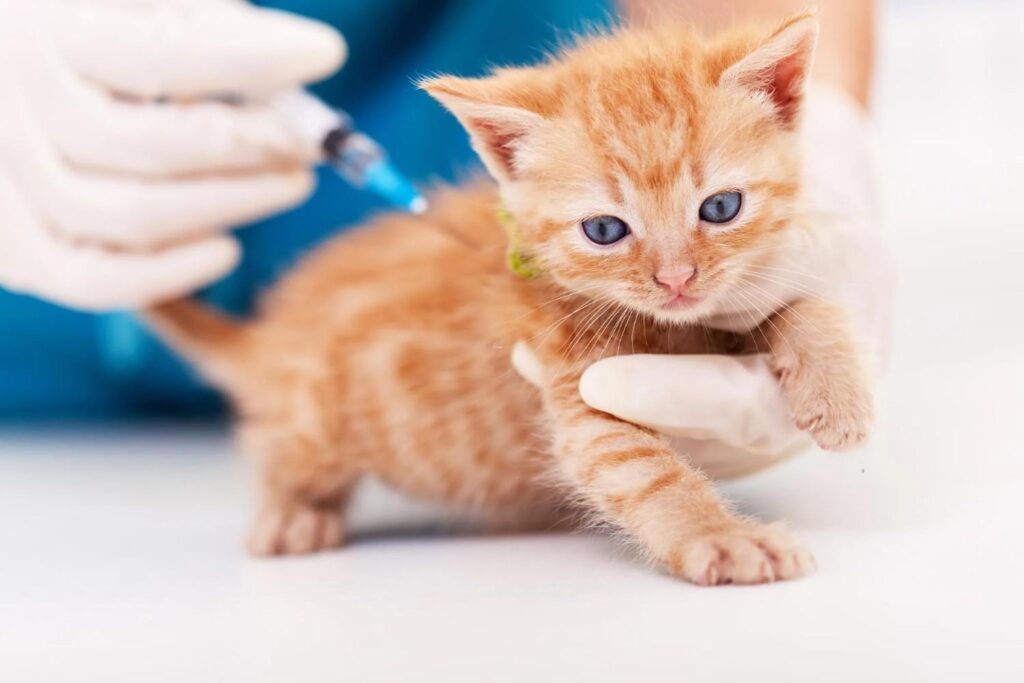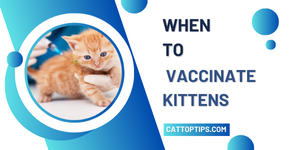Getting a new kitten is an exciting experience, but it comes with the responsibility of keeping them safe and healthy. Vaccinating your kitten is one of the most important steps you can take to protect them from diseases. Many cat owners have questions like, when should I vaccinate my kitten?, when do kittens get vaccinated?, or when should cats be vaccinated? In this guide, we’ll cover everything you need to know about kitten vaccinations in an easy-to-understand way.

Why Vaccinations Matter for Kittens
Vaccinations are essential for helping your kitten’s immune system learn to fight off serious diseases. Kittens are born with some immunity from their mothers, but it doesn’t last long. Vaccines give them the protection they need, especially as they grow and explore the world. For indoor cats, vaccinations are still crucial since some diseases can spread through the air or via contact with other pets or people.
When Should I Vaccinate My Kitten?
The timing of vaccinations is important to help your kitten build strong immunity. Generally, kittens should begin vaccinations when they are six to eight weeks old. After that, they receive booster shots every three to four weeks until they are about 16 weeks old. Here’s a typical schedule to follow:
- 6-8 Weeks Old: First round of vaccines, usually including FVRCP, which protects against three major diseases.
- 10-12 Weeks Old: Second round of vaccines (booster for FVRCP).
- 14-16 Weeks Old: Final FVRCP booster and the first rabies shot.
Vaccines need to be given in multiple rounds because a single dose won’t fully protect a kitten’s young immune system. After this series of shots, your kitten should get booster shots once a year. For more tips on caring for your kitten, check out resources at Cattoptips.
What Vaccines Do Kittens Need?
Kittens need a few essential, or “core,” vaccines, and in some cases, they may need additional “non-core” vaccines based on their lifestyle.
Core Vaccines
FVRCP: This vaccine protects against three common diseases:
- Feline Viral Rhinotracheitis: A respiratory infection that affects the nose, throat, and eyes.
- Calicivirus: Another virus that can cause respiratory problems and mouth sores.
- Panleukopenia: Also known as feline distemper, this is a severe disease that attacks the digestive system and white blood cells.
- Rabies: This vaccine is essential and is often required by law. Rabies is a deadly disease that affects the brain and can spread to humans, so it’s important to vaccinate your kitten against it.
Non-Core Vaccines
Depending on your kitten’s lifestyle, your vet may recommend other vaccines. For example:
- Feline Leukemia (FeLV): Recommended for kittens who go outdoors or are around other cats. It protects against a virus that can weaken the immune system.
- Bordetella: Helpful for kittens in multi-cat homes or those that might board at a pet facility.
Preparing Your Kitten for Vaccinations
Taking your kitten to the vet can be stressful for both of you. Here are some tips to help make the experience smoother:
Get Them Used to Their Carrier: Place cozy blankets in the carrier and let your kitten spend time in it at home so they feel safe during the trip.
Plan a Calm Environment: Try to keep your kitten relaxed before the appointment. A quiet setting can help ease their nerves.
Ask Questions: Don’t hesitate to ask your vet any questions you have. They can explain the importance of each vaccine and what to expect afterward.
Most kittens handle vaccines well, though they may feel a bit sleepy afterward. Some kittens might be extra cuddly, which is a great excuse for bonding time!
Possible Side Effects of Kitten Vaccines
Vaccines are generally safe, but some kittens might experience mild side effects. Here’s what to watch for:
- Sleepiness: It’s normal for kittens to feel tired for a day or two after vaccinations.
- Low Fever: A slight fever can sometimes happen as the immune system responds to the vaccine.
- Mild Swelling at the Injection Site: You may notice a small bump where the shot was given, but it should go away within a few days.
If your kitten shows any serious symptoms, like trouble breathing or extreme lethargy, contact your vet immediately. While rare, these symptoms can be signs of an allergic reaction.
Keeping Track of Vaccination Records
Keeping a record of your kitten’s vaccinations is a good idea. You can use a notebook, an app, or your phone to track when each vaccine was given and when the next one is due. Your vet might also provide a reminder service.
Having a record helps ensure you stay on schedule for boosters, which are just as important as the initial shots. Booster shots keep your cat’s immunity strong against infections.
The Importance of Vaccines for Indoor Cats
Even if your kitten stays indoors, vaccinations are still important. Some diseases, like the ones protected by the FVRCP vaccine, can spread through the air or can be brought in by people or other animals. Rabies vaccinations are also essential, as rabies is a dangerous disease that can spread to humans. Keeping up with vaccinations will give your kitten the best protection and peace of mind for you.
Adult Cat Vaccination Schedule
As your kitten grows into an adult cat, vaccinations are still necessary. Most adult cats will need booster shots every one to three years, depending on the type of vaccine. Keeping up with this schedule helps your cat stay healthy and ready to fight off any infections they may encounter.
Regular check-ups also allow your vet to monitor your cat’s overall health, so these annual visits are an excellent time to catch any health issues early.
Conclusion: A Healthier Life for Your Kitten Starts with Vaccines
Knowing when to vaccinate kittens can feel overwhelming, but following a regular schedule is essential for your kitten’s health and safety. Starting at six to eight weeks old, vaccines give your kitten the protection they need against serious diseases.
By following your vet’s advice and keeping track of vaccine dates, you’re helping your kitten grow into a strong, healthy cat. Vaccines are a small investment that brings a lifetime of benefits for both you and your furry friend.
For more helpful advice on caring for your kitten, visit Cattoptips. With the right information, you can give your kitten a great start in life and a strong foundation for good health.
Common Questions About Kitten Vaccinations
Let’s go over some common questions to help you feel confident about vaccinating your kitten.
1. When Should Kittens Get Vaccinated?
Kittens should start vaccinations around six to eight weeks old. Your vet will help set a schedule, but the typical plan involves a series of shots every three to four weeks until your kitten is about 16 weeks old.
2. When Can Kittens Get the Rabies Vaccine?
The rabies vaccine is usually given when a kitten is around 16 weeks old, during their last set of core vaccinations. This vaccine is important for your kitten’s safety and is often required by law.
3. When Should I Get My Kitten Vaccinated if They Miss a Dose?
If your kitten misses a scheduled vaccine, contact your vet as soon as possible to reschedule. It’s essential to complete the vaccine series for full protection. Skipping doses may mean that your kitten isn’t fully protected.
4. When Do Cats Need Booster Shots?
Once your kitten has completed their first vaccinations, they will need booster shots once a year to keep their immunity strong.


